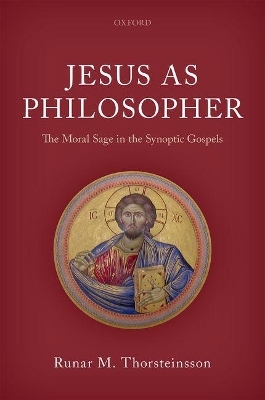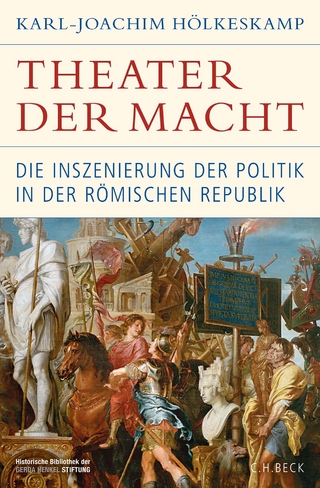
Jesus as Philosopher
The Moral Sage in the Synoptic Gospels
Seiten
2018
Oxford University Press (Verlag)
978-0-19-881522-8 (ISBN)
Oxford University Press (Verlag)
978-0-19-881522-8 (ISBN)
This book examines the possible ways in which the authors of the Synoptic Gospels, Mark, Matthew, and Luke, were inspired by philosophical traditions. It considers how the authors discussed Jesus in relation to contemporary philosophy.
Jesus as Philosopher: The Philosophical Sage in the Synoptic Gospels examines the possible ways in which the authors of the Synoptic Gospels, Mark, Matthew, and Luke, were inspired by contemporary philosophical traditions about the ideal philosophical sage in their description of their ideal human being, Jesus Christ. Runar M. Thorsteinsson considers the following questions: How does the author in question speak of Jesus in relation to contemporary philosophy? Do we see Jesus take on a certain 'philosophical' role in the Gospels, either by his statements and reasoning or his way of life? In what way are Jesus' words and actions analogous to that of leading philosophical figures in Graeco-Roman antiquity, according to these texts? Conversely, in what way do his words and actions differ from theirs?
While Thorsteinsson discusses a number of Graeco-Roman sources, the emphasis is on the question of how these parallel texts help us better to understand the Gospel authors' perception and presentation of the character of Jesus. While the fields of theology and ethics are often intertwined in these texts, including the philosophical texts, Thorsteinsson's main focus is the ethical aspect. He argues that the Gospel authors drew in some ways on classical virtue ethics. The study concludes that the Gospel authors inherited stories and sayings of Jesus that they wanted to improve upon and recount as truthfully as possible, and they did so in part by making use of philosophical traditions about the ideal sage, especially that of Stoicism and Cynicism.
Jesus as Philosopher: The Philosophical Sage in the Synoptic Gospels examines the possible ways in which the authors of the Synoptic Gospels, Mark, Matthew, and Luke, were inspired by contemporary philosophical traditions about the ideal philosophical sage in their description of their ideal human being, Jesus Christ. Runar M. Thorsteinsson considers the following questions: How does the author in question speak of Jesus in relation to contemporary philosophy? Do we see Jesus take on a certain 'philosophical' role in the Gospels, either by his statements and reasoning or his way of life? In what way are Jesus' words and actions analogous to that of leading philosophical figures in Graeco-Roman antiquity, according to these texts? Conversely, in what way do his words and actions differ from theirs?
While Thorsteinsson discusses a number of Graeco-Roman sources, the emphasis is on the question of how these parallel texts help us better to understand the Gospel authors' perception and presentation of the character of Jesus. While the fields of theology and ethics are often intertwined in these texts, including the philosophical texts, Thorsteinsson's main focus is the ethical aspect. He argues that the Gospel authors drew in some ways on classical virtue ethics. The study concludes that the Gospel authors inherited stories and sayings of Jesus that they wanted to improve upon and recount as truthfully as possible, and they did so in part by making use of philosophical traditions about the ideal sage, especially that of Stoicism and Cynicism.
Runar M. Thorsteinsson is Professor of New Testament in the Faculty of Theology and Religious Studies at the University of Iceland. He is the author of Roman Christianity and Roman Stoicism: A Comparative Study of Ancient Morality (Oxford University Press, 2010).
Abbreviations
Introduction: Purpose and Approach
1: Philosophy and Philosophical Sages in the Graeco-Roman World
2: Jesus as Philosopher in the Gospel of Mark
3: Jesus as Philosopher in the Gospel of Matthew
4: Jesus as Philosopher in the Gospel of Luke
Conclusion
Bibliography
Index of Subjects
Index of Modern Authors
Index of Ancient References
| Erscheinungsdatum | 11.05.2018 |
|---|---|
| Verlagsort | Oxford |
| Sprache | englisch |
| Maße | 147 x 225 mm |
| Gewicht | 402 g |
| Themenwelt | Geschichte ► Allgemeine Geschichte ► Altertum / Antike |
| Geschichte ► Teilgebiete der Geschichte ► Religionsgeschichte | |
| Geisteswissenschaften ► Philosophie ► Philosophie Altertum / Antike | |
| Religion / Theologie ► Christentum ► Bibelausgaben / Bibelkommentare | |
| Religion / Theologie ► Christentum ► Kirchengeschichte | |
| ISBN-10 | 0-19-881522-0 / 0198815220 |
| ISBN-13 | 978-0-19-881522-8 / 9780198815228 |
| Zustand | Neuware |
| Haben Sie eine Frage zum Produkt? |
Mehr entdecken
aus dem Bereich
aus dem Bereich
Die unglaubliche Geschichte eines antiken Söldnerheeres
Buch | Hardcover (2022)
C.H.Beck (Verlag)
CHF 39,20
die Inszenierung der Politik in der römischen Republik
Buch | Hardcover (2023)
C.H.Beck (Verlag)
CHF 67,20


